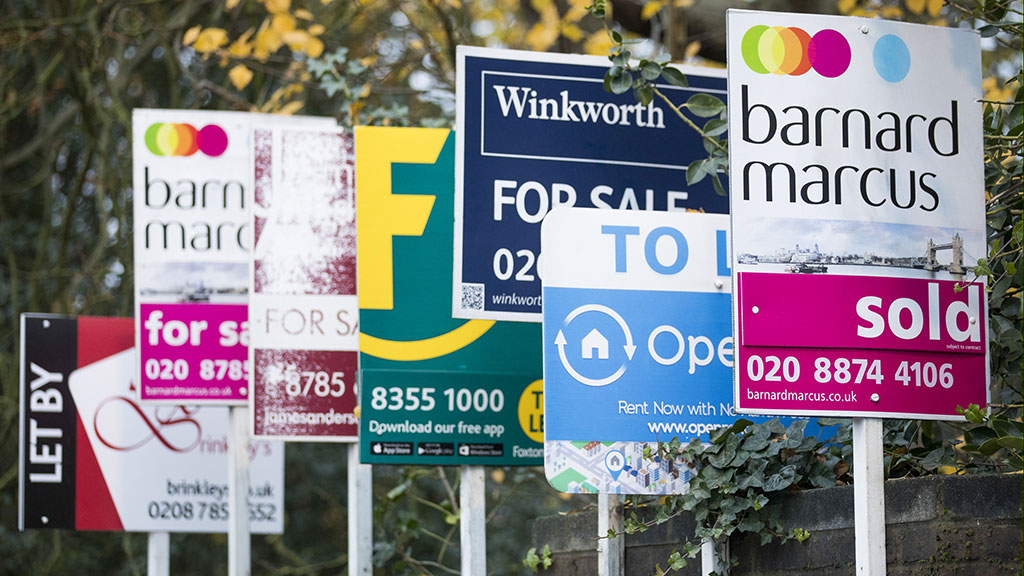Are UK house prices really on the rebound?
The latest house price data from the Office for National Statistics paint a picture of a housing market that is showing signs of rallying. That's not necessarily good news, says John Stepek.


Get the latest financial news, insights and expert analysis from our award-winning MoneyWeek team, to help you understand what really matters when it comes to your finances.
You are now subscribed
Your newsletter sign-up was successful
Want to add more newsletters?

Twice daily
MoneyWeek
Get the latest financial news, insights and expert analysis from our award-winning MoneyWeek team, to help you understand what really matters when it comes to your finances.

Four times a week
Look After My Bills
Sign up to our free money-saving newsletter, filled with the latest news and expert advice to help you find the best tips and deals for managing your bills. Start saving today!
UK house prices rose by 2.2% in the year to November, to an average of £235,000, according to the latest data from the Office for National Statistics (ONS).
Average prices rose by 1.7% in England (to £251,000), with a 7.8% jump in Wales (to £173,000), a 3.5% rise in Scotland (to £155,000), and a 4% rise in Northern Ireland (to £140,000). In London, prices rose by 0.2% - not much, but a big improvement on the negative readings seen for most of last year.
In all, it paints a picture of a housing market that is showing signs of rallying. Particularly if you look at it on a chart, as per the ONS one below.
MoneyWeek
Subscribe to MoneyWeek today and get your first six magazine issues absolutely FREE

Sign up to Money Morning
Don't miss the latest investment and personal finances news, market analysis, plus money-saving tips with our free twice-daily newsletter
Don't miss the latest investment and personal finances news, market analysis, plus money-saving tips with our free twice-daily newsletter

Putting it bluntly, that’s not necessarily good news. As we’ve been pointing out at MoneyWeek for a couple of years now at least, it would be best if house prices continued to flatten or fall gently, to allow earnings to play catch up.
In the absence of a better solution – which would involve a lot of political finesse, long-term thinking, and the tackling of a lot of vested interests, and thus seems unlikely – this is the easiest and least painful way to return house prices across the UK to some sort of semblance of affordability.
A rebound now would jeopardise that. So how seriously should we take the figures?
One point to note is that the ONS figures, while official, are relatively new compared to other long-running surveys such as those compiled by Nationwide or Halifax. You can see that they still need to iron out aspects.
That near-8% jump in Wales does rather stand out. Apparently, it’s down to two things – there was a rise in the number of expensive properties were being bought and sold in the likes of Cardiff (in other words, the typical house sold last month was more expensive than ones in previous months), and also, the large year-on-year rise was exaggerated by a “fall in prices during the same period in 2018.”
So the figures are worth taking with a pinch of salt.
That said, there are some reasons that you might expect a rally of sorts, and it’s worth considering them. November’s figures are unlikely to show any bounce related to politics - after all, these deals were all done before the election.
However, house prices have been flat or falling for some time, and importantly, mortgages have grown cheaper over the year - according to Moneyfacts.co.uk, the cheapest five-year fix for someone with just a 5% deposit, came in at 3.37% in January, but 2.75% in November. So the availability of cheaper credit combined with a sense that it might be a buyer’s market, may be helping things.
Meanwhile, the worst of the landlord exodus may be behind us - while there are still tax changes to come, those who are still hanging on in there must surely have some idea of what it’s now costing them to do so.
If indeed, cheaper loans are helping to boost prices, then it could continue - particularly if the Bank of England does decide to cut rates again. Combine it with a sense that foreign buyers are back in the market at the top end to bag a bargain while sterling is still weak ahead of Brexit, and we could see a sustained bounce in 2020.
Frankly, we hope it doesn’t happen. And arguably, credit conditions can only slacken so much further. But that’s the key thing to watch if you want an idea of where prices will go - what price is a mortgage and how easy is it to get? If they get even cheaper and more accessible than they are now, then all else being equal, prices will go up.
Get the latest financial news, insights and expert analysis from our award-winning MoneyWeek team, to help you understand what really matters when it comes to your finances.

-
 Should you buy an active ETF?
Should you buy an active ETF?ETFs are often mischaracterised as passive products, but they can be a convenient way to add active management to your portfolio
-
 Power up your pension before 5 April – easy ways to save before the tax year end
Power up your pension before 5 April – easy ways to save before the tax year endWith the end of the tax year looming, pension savers currently have a window to review and maximise what’s going into their retirement funds – we look at how